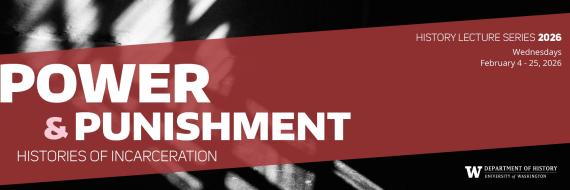A Seattle Tradition for Over 50 Years
In 1975, newly retired professor of history, Giovanni Costigan, held the first History Lecture Series. Costigan, a very well-known part of the UW community, began the series as a way to bring history to the wider community and to spark dialogue around important topics. In the 1990s, Professor Jon Bridgman took up the mantle and carried the series into a new century. After his retirement, the faculty of the department chose to carry on what had by that time become a beloved UW tradition. Now, over fifty year later, Costigan's legacy is still strong thanks to the generous support we receive from our alumni and friends whose gifts help sustain this treasured series.
Show your support of the History Lecture Series by making a donation today!
2026 History Lecture Series

Incarceration is a hotly debated topic in the United States, a country that has one of the highest rates of incarceration in the world. Looking at the practice from a historical perspective, what can incarceration teach us about who we were and who we are now? What might histories of incarceration, and the histories of those who have been incarcerated, tell us about power dynamics, belonging, exclusion, struggle, and hope across societies in the past and present? Join UW History for the 2026 History Lecture Series, where we will explore the practice of incarceration, tracing its change over time from antiquity to our modern world.
Series talks will take place on Wednesdays, February 4 through 25, 2026, at 7:30 p.m. in Roethke Auditorium (Kane Hall 130).
February 4 | Mark Letteney | Roman Prisons and the Mirror of History
Ancient architects tell us that every Roman settlement should have a prison at its center, and archaeology suggests that most cities did. Purpose-built prisons populated the ancient Mediterranean and so did practices of incarceration: sentences of prison time stood beside manual labor in cities, in bakeries, and in mines. Less fortunate souls entered facilities to await execution, sometimes for years. This lecture explores the evidence for ancient incarceration in vignettes: reading letters that prisoners wrote on papyrus, investigating spaces where they were held, and analyzing depictions of captives in monuments, law-courts, and homes. Roman evidence does not model a just society, but it does offer a mirror where we can see modern practices of incarceration in a new light, asking which aspects of contemporary prisons are unique to modernity, and which reflect longer histories.
February 11 | Charity Urbanski | Taking Hostages and Prisoners: Incarceration in Medieval Europe
The phrase “medieval incarceration” usually conjures images of prisoners condemned to a damp dungeon and forgotten, but this was rarely the reality. Prisoners were often nobles who ran afoul of the king, disobedient monks, or wealthy people who could afford to pay a ransom, and the conditions in which they were held normally reflected their social status. This lecture explores the wide variety of carceral practices in medieval Europe and examines how the recovery of Roman law and the concept of the state in the twelfth century began to transform those practices.
February 18 | Moon-Ho Jung | Interrogating Loyalty: Japanese Americans and World War II
In 1942, the US government incarcerated more than 120,000 Japanese Americans in concentration camps, based on the racist argument that they were likely “disloyal” to the United States. In the ensuing years of World War II, the US government simultaneously sought to demonstrate the “loyalty” of Japanese Americans to American democracy. By placing US wartime policies and Japanese American responses in different historical contexts, this lecture will interrogate the meanings of loyalty, democracy, and national security—during World War II and in our own time.
February 25 | Dan Berger | The Washington Prison History Project: Counter-Archives and Local Histories
Prison is more than a place of punishment. It is also an archive. Yet the official story found in sentencing reports and conduct reviews is only part of the story. Incarcerated people generate a parallel counter-archive of resistance and transformation. The Washington Prison History Project is a multimedia digital effort to document this counter-archive at a local level. Across a series of publications, programs, and protests, incarcerated people have shown prison to be a central feature in the development of Washington and the country. An examination of this archive tells a different history of our state—and its possible futures.
Register to attend the 2026 History Lecture Series
If you are interested in the series but unable to attend in person, video recordings of each lecture will be available on this page without needing to register.
Resources
Looking for more information on the topics presented in this series? Check out our History Lecture Series Resources page.
Past Series
Check out the Past History Lecture Series page to enjoy over a decade of our renowned HLS lectures on a wide range of themes.
Other Lectures
View other Department of History lectures such as the annual Stephanie M.A. Camp Memorial Lecture on Race and Gender, our Sports History Series, and more.